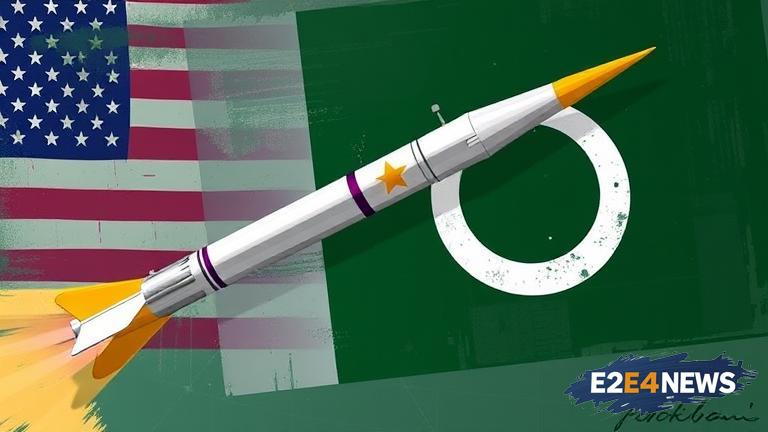The United States has imposed sanctions on four Pakistani firms, citing their alleged involvement in Pakistan’s ballistic missile programme. The sanctions, which were announced by the US Department of Commerce, aim to prevent the firms from accessing American technology and expertise. The move is seen as a significant blow to Pakistan’s defence industry, which has been working to develop its ballistic missile capabilities in recent years. The sanctions are also expected to have a negative impact on Pakistan’s economy, which is already facing significant challenges. The four firms that have been sanctioned are said to have been involved in the development and production of ballistic missiles, including the Nasr and Shaheen missiles. The US has accused the firms of providing material support to Pakistan’s ballistic missile programme, which it claims is a threat to regional and global security. Pakistan has denied the allegations, saying that its ballistic missile programme is solely for defensive purposes. The sanctions have been met with widespread criticism in Pakistan, with many seeing them as an attempt by the US to undermine the country’s defence capabilities. The Pakistani government has vowed to take all necessary measures to protect its defence industry and ensure that the sanctions do not have a significant impact on the country’s economy. The US has a long history of imposing sanctions on countries that it accuses of developing weapons of mass destruction, including ballistic missiles. The sanctions are seen as a key tool in the US arsenal for preventing the proliferation of such weapons. However, critics argue that the sanctions can have unintended consequences, including harming the economies of the countries that are targeted. The sanctions on the Pakistani firms are also seen as part of a broader effort by the US to contain the spread of ballistic missile technology in the region. The US has been working to strengthen its alliances with other countries in the region, including India, in an effort to counter the growing influence of China and other powers. The sanctions on the Pakistani firms are likely to further strain relations between the US and Pakistan, which have been tense in recent years. The two countries have a long history of cooperation on defence and security issues, but there have been significant differences in recent years over issues such as counter-terrorism and Afghanistan. The sanctions are also likely to have a negative impact on Pakistan’s relations with other countries in the region, including China and Russia. Both countries have significant economic and strategic interests in Pakistan and are likely to be concerned about the impact of the sanctions on the country’s economy and defence capabilities. The Pakistani government has said that it will work to diversify its economy and reduce its dependence on American technology and expertise. The government has also said that it will work to strengthen its alliances with other countries in the region, including China and Russia, in an effort to counter the impact of the sanctions. The sanctions on the Pakistani firms are a significant development in the region and are likely to have far-reaching consequences for Pakistan’s economy and defence capabilities. The move is seen as a significant escalation of tensions between the US and Pakistan and is likely to further strain relations between the two countries. The sanctions are also likely to have a negative impact on regional security, as they may prompt Pakistan to accelerate its ballistic missile programme in an effort to counter the perceived threat from the US and other powers. The US has said that it will continue to work to prevent the proliferation of ballistic missile technology in the region and will take all necessary measures to protect its interests and those of its allies. The sanctions on the Pakistani firms are a significant step in this effort and are likely to be followed by further measures in the coming months and years.
